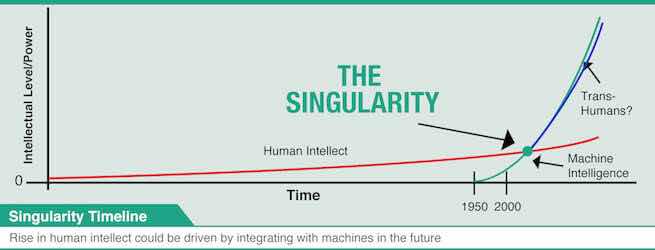2020 has been the Gateway to the Nexttech Revolution - where computing continues to climb the exponential curve at speeds that are leaving us breathless..


New technologies, AI, 5G , Robots and people are converging to eliminate inefficiencies and frictions from markets.
The physical world is being sensed, tagged and linked to the Internet with massive amounts of new data being generated and stored as storage capacity in the cloud has become virtually infinite.
AI algorithms are analyzing that data. New market interfaces are arising. Blockchain technology shows promise to establish trust between market participants in a decentralized, encrypted and secure manner.
The convergence of real-time communications, blockchain and the IoT is creating “stock exchanges” for all kinds of goods and services - not just commodities.
Manufacturing-as-a-Service (MaaS) platforms will enable you to get parts into production in less than five minutes.
Fast-tracking drug research and testing will enable pharmaceutical manufacturers to save major cost (on average, in excess of $1 billion) and time (10-15 years) for new drug development.
Connectivity will continue to become more ubiquitous - at the expense of privacy - zoom will be like the black and white tv - think chips in brain - that will enable you to click between real and virtual - blink to see data about person you look at .
AI will exceed human levels of intelligence - blurring of man and machine - including emotional intelligence on so many levels - there won’t be a job or profession that won’t be augmented and possibly replaced by AI. AI applications and adoption is projected to boost global GDP by between $13-15 trillion by 2030.
EAAS - everything as a service the sharing economy is making excess or idle capacity a thing of the past!
- Uber is the world’s largest taxi company but owns no cars; giant retailer
- Alibaba stocks no inventory, serving instead as broker between buyers and sellers;
- Airbandb don’t own property
- Instagram, doesn’t make or sell cameras.

This sharing economy model is spreading from cars and apartments to expensive but under-utilised capital equipment — from tractors to magnetic resonance imaging (MRI) machines), and from drones to manufacturing equipment.All are available on an as-a- service basis.
The model will also extend to services industries, where individual skill capacities are currently under-leveraged.... (this will proliferate the GIG economy!) .
Think Uber for training - where universities are a thing of the past - major disruption
The increasing recognition of your personal data as a valuable asset will likely lead to new personal data exchanges, and the power will well and truly be transferred from the corporation and government to you! The collateral damage will be the loss of our privacy!
The current critical skills shortage will worsen. Simultaneously, over a fifth of today’s workforce faces displacement by technology(800 million people) - will we need a universal basic income?
Those at the forefront of this #nexttechrevolution will seize the largest shares of these gains.
So, what do you need to do to take advantage of this Nexttech Revolution?

Consider people first.
Revamp your approach to human resources and talent, employee motivation, recruiting, training and skills development.
Educate and reskill your people -prepare them for the future of work - enable your teams to use AI and tech!!
Emphasize skill over knowledge and lifelong learning over front-loaded educational systems.
Implement new technologies. Automation and AI, block-chain and big data: these elements of the #nexttechrevolution have the power to generate major competitive advantage.
Here are some questions that a company entering the Nexttech Revolution need to think about
- How will machines and humans partner to do what each of them does best?
- What can business and governmental leaders do to enable this?
- How do we teach people to learn how to learn?
- Do your people have the skills they need to work alongside robots and algorithms?
- What responsibility do businesses and governments have for preparing workers for the era of automation?
- What is the future of retirement?
- Is your organization attuned for the new capabilities of smarter manufacturing?
Sources
https://traccsolution.com/blog/megatrends-2030/
DOWNLOAD Recovery and resilience: Safeguarding and strengthening the supply chain to thrive through uncertainty for practical strategies to help you safeguard your supply chain and ensure resilience in times of disruption.
1‘The United Nations Department of Economic and Social Affairs, Population Division
2‘Global Trends 2030: Alternative Worlds,’ US National Intelligence Council, page iv
3‘Fourth Industrial Revolution: Beacons of Technology and Innovation in Manufacturing’, World Economic Forum, January 2019, figure 2, page 9
4‘https://xconomy.com/san-diego/2019/08/07/organovo-halts-liver-tissue-rd-plans-restructuring-to-cut-costs/
5‘What’s after what’s next? The upside of disruption’, EY, 2018, page 17
Sources
‘Nothing to fear from imminent Blade Runner world’, Business Day, 25 September 2019
‘What’s after what’s next? The upside of disruption’, EY, 2018
‘Manufacturing-As-A-Service Platforms: The New Efficiency Revolution’, Marco Annunziata, forbes.com, 13 May 2019
‘From the AI Frontier: Modeling the Impact of AI on the World Economy’, McKinsey Global Institute, September 2018
‘Navigating a World of Disruption’, McKinsey Global Institute, January 2019
‘The World in 2030: Nine Megatrends to Watch,’ Andrew S. Winston, MIT Sloan Management Review, 7 May 2019
‘Five Megatrends And Their Implications for Defense & Security’, PwC, November 2016
‘2018 Revision of the World Urbanization Prospects’, Population Division of the United Nations Department of Economic and Social Affairs (UN DESA), 2018
‘Global Trends 2030: Alternative Worlds’, US National Intelligence Council, December 2012
‘Fourth Industrial Revolution: Beacons of Technology and Innovation in Manufacturing’, World Economic Forum, January 2019
‘WTO lowers trade forecast as tensions unsettle global economy,’ World Trade Organisation Press Release, 1 October 2019
time.com
xconomy.com
